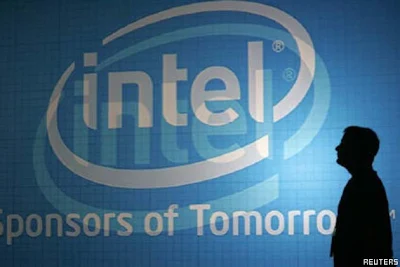Intel unveils next-gen Ivy Bridge processors
San Francisco: Intel Corp on Wednesday took the wraps off next-generation technology that crams more transistors onto microchips, betting it will help the chipmaker catch up in the red-hot tablet and smartphone market.
Intel expects to use the new technology to make PC and server chips, code-named Ivy Bridge, by the end of 2011 and will later use it to make improved processors for mobile devices.
The cutting-edge technology - which Intel says breaks new ground by moving away from flat circuitry to a three-dimensional model - may eventually challenge rival ARM Holdings, whose chip technology is favored in devices like Apple's iPad.
Intel unveils next-gen Ivy Bridge processors
Shares of Intel rose about 2 per cent to close at $23.50 while ARM's shares closed down 7.3 per cent at 5.58 pounds in London.
Santa Clara, California-based Intel's processors are the brains in 80 per cent of the world's personal computers but have failed to find their way into smartphones and tablets, and the world's biggest chipmaker is racing to catch up.
"This is necessary but not sufficient. There are many other things we need to do," Intel Executive Vice President Dadi Perlmutter told reporters.
Some analysts believe Intel's proprietary chip architecture, known as "x86" and originally designed to deliver hefty performance to PCs, is inherently unsuitable for mobile devices where power efficiency is a major factor.
Others say that once Intel, with deep pockets to pay for research and development, adjusts its thrust toward energy-efficient processors, its manufacturing technology lead will help it become a serious competitor in smartphones and other mobile gadgets.
"With the convergence of PCs, smartphones and tablets, clearly Intel wants to get out of its core PC market. The issue is 'Can they come up with a processor that is sufficiently power efficient to be competitive in the mobile computing space?'" said Adrien Bommelaer, an analyst at Matrix.
THE GOLD STANDARD
Energy-efficient chips that conserve batteries and are made with technology licensed by ARM are used by Apple, Samsung and Motorola, and have become the industry standard in mobile devices at the expense of Intel.
But Intel's manufacturing technology is far ahead of other chip companies, giving it a major advantage in building fast and efficient processors.
Since the 1960s, Intel and other semiconductor companies have sunk billions of dollars into research and development, letting them double the number of transistors they can squeeze onto microchips every two years, and paving the way for smaller and faster electronics gadgets.
Intel accomplished its latest improvement by turning wide, flat channels that electrons flow through onto their thinner sides so that they can be packed closer together on the silicon chip.
Intel said the new 22 nanometer (nm) chips would offer higher performance - lower line-widths mean more transistors and faster speeds - and consume less electricity than its current 32 nm chips.
Rival chipmakers are at least a year behind Intel in developing similar new technology, analysts said.
To further extend its lead in manufacturing technology and help catch up in the mobile race, Intel last month raised its capital spending plan for 2011 to $10.2 billion from $9 billion.
The costs of developing and building ever more advanced manufacturing technology are snowballing, but Intel has the deep pockets to continue pushing its technology roadmap, analysts say.
"Intel's scientists and engineers have once again reinvented the transistor, this time utilising the third dimension," said Intel CEO Paul Otellini in a statement.
Read more at:http://ibnlive.in.com/news/intel-unveils-nextgen-ivy-bridge-processors/151286-11.html












No comments: